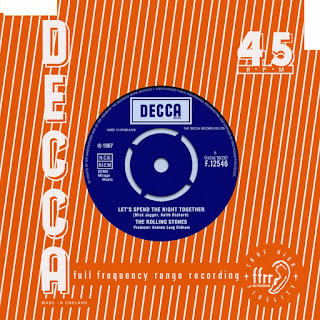Rolled Gold: The Very Best of the Rolling Stones is a compilation album by The Rolling Stones released without the band's authorisation by its former label Decca Records in 1975. It is a double album that reached No. 7 on the UK chart and was a strong seller over the years.
In 2007, the original collection was expanded to 40 songs from the original's 28 tracks. Released in the UK on 12 November 2007, it is an expanded rerelease of the original 1975 collection which reached No. 7 on the UK chart.
The set debuted at No. 26 on the UK chart on 18 November 2007, and has sold over 125,000 copies so far according to Music Week.
The album is available in double CD, quadruple vinyl LP, and USB flash drive editions; the USB edition was the first album to be released in the UK in this format. It is also available via digital download. Cover design by Alex Trochut.
Revised track listing
All tracks are written by Mick Jagger and Keith Richards except where noted.
Disc one
- "Come On" Berry June 1963 1:49
- "I Wanna Be Your Man" Lennon-McCartney November 1963 1:44
- "Not Fade Away" Petty/Hardin February 1964 1:48
- "Carol" Berry June 1964 1:48
- "Tell Me" June 1964 3:49
- "It's All Over Now" Womack/Womack June 1964 3:27
- "Little Red Rooster" Dixon November 1964 3:07
- "Heart of Stone" December 1964 2:51
- "Time Is on My Side" Meade/Norman September 1964 2:59
- "The Last Time" February 1965 3:42
- "Play with Fire" Nanker Phelge February 1965 2:13
- "(I Can't Get No) Satisfaction" May 1965 3:44
- "Get Off of My Cloud" September 1965 2:55
- "I'm Free" September 1965 2:24
- "As Tears Go By" Jagger/Richards/Oldham December 1965 2:46
- "Lady Jane" June 1966 3:09
- "Paint It Black" May 1966 3:24
- "Mother's Little Helper" July 1966 2:46
- "19th Nervous Breakdown" February 1966 3:59
- "Under My Thumb" April 1966 3:43
- "Out of Time" April 1966 5:37
- "Yesterday's Papers" January 1967 2:05
- "Let's Spend the Night Together" January 1967 3:37
- "Have You Seen Your Mother, Baby, Standing in the Shadow?" September 1966 2:34
Total length: 1:02:41
Disc two
- "Ruby Tuesday" January 1967 3:15
- "Dandelion" August 1967 3:32
- "She's a Rainbow" December 1967 4:14
- "We Love You" August 1967 4:24
- "2000 Light Years from Home" December 1967 4:47
- "Jumpin' Jack Flash" May 1968 3:43
- "Street Fighting Man" August 1968 3:15
- "Sympathy for the Devil" December 1968 6:20
- "No Expectations" December 1968 3:56
- "Let It Bleed" December 1969 5:28
- "Midnight Rambler" December 1969 6:55
- "Gimme Shelter" December 1969 4:33
- "You Can't Always Get What You Want" December 1969 7:28
- "Brown Sugar" April 1971 3:50
- "Honky Tonk Women" July 1969 3:01
- "Wild Horses" June 1971 5:42
Total length: 1:14:23


































